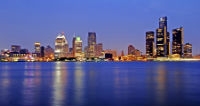Detroit Doubles Room Bookings for 2014, Snags Several New Citywides

When Detroit’s bankruptcy made headlines last year, the local hospitality, meetings and conventions community continued to work hard to spread the word about what they already knew: Detroit’s events business was not only alive and well, but also it was thriving.
The Cobo Center was in the midst of a $220 million renovation that included expanded space, floor-to-ceiling windows facing the Detroit River and a new Grand Ballroom, among other renovations.
The center also had been taken over in 2010 by SMG, a venue management company that worked with local labor to come up with new work rules that went into effect in June 2013.
Thom Connors, general manager of Cobo Center for SMG, said at the time, “This agreement makes Cobo’s costs more competitive with standards for the exposition and meeting industry,”
And now, at the start of a new year, the city has even more to brag about, with bookings in 2014 tracking 208 percent ahead of last year, according to Bill Bohde, senior vice president of sales and marketing for the Detroit Metro Convention & Visitors Bureau.
In 2013, there were 129,500 room nights booked, and this year, so far, there are 236,600 on the books, with another 35,000 to 40,000 expected by the end of the year. Next year has approximately 165,000 already booked as well, Bohde said.
“We have a solid foundation to have an equally good year in 2015,” he added. “One of the reasons that’s driving the success is we have an extremely attractive product to offer meeting planners.”
Here are just a few of the major groups booked in 2014:
The Christian Congregation of Jehovah Witnesses, attracting 60,000 room nights and almost $57 million in direct spending;
Nation of Islam, with 7,000 room nights and $3.7 million in spending; and
Neighborhood Works America, 7,800 room nights and spending of $1.4 million.
Despite the bankruptcy, Bohde said the bureau wasn’t impacted or the Cobo Center, since neither are funded through the government. The bureau, for example, is more than 90 percent funded through a 2-percent hotel occupancy tax.
But, it still has been an uphill battle to combat some negative perceptions about Detroit.
In an effort to get ahead of it, though, Bohde said the bureau put into place a marketing campaign that told the story about the $1 billion in development in the city, the renovation at Cobo and the new hotel spaces coming on line, as well as much more good news.
“We decided to attack it head on,” he added. “This destination is healthy. … It’s not shuttered up or closed down.”
In fact, the bureau’s marketing campaign has the tagline “Detroit, America's Greatest Comeback City."
The key is getting meeting planners to the city to see all of the enhancements going on, and Detroit will have that opportunity next year when thousands of attendees come to town for the American Society of Association Executives’ annual meeting and exhibition.
“It’s known as the Super Bowl for the (meetings) industry,” Bohde said. “We’re ready to put on quite a show."
He added, “I hope we’re going to change many perceptions about the way people see Detroit. It’s going to give us a tremendous amount of exposure. It’s really Detroit’s coming out party.”


Add new comment